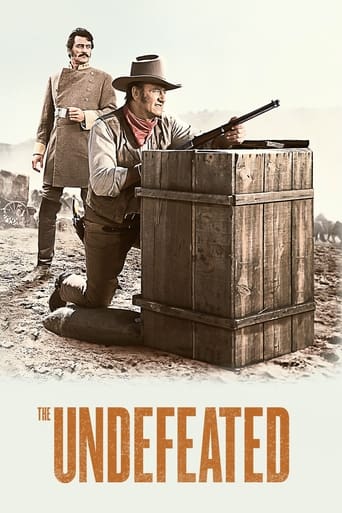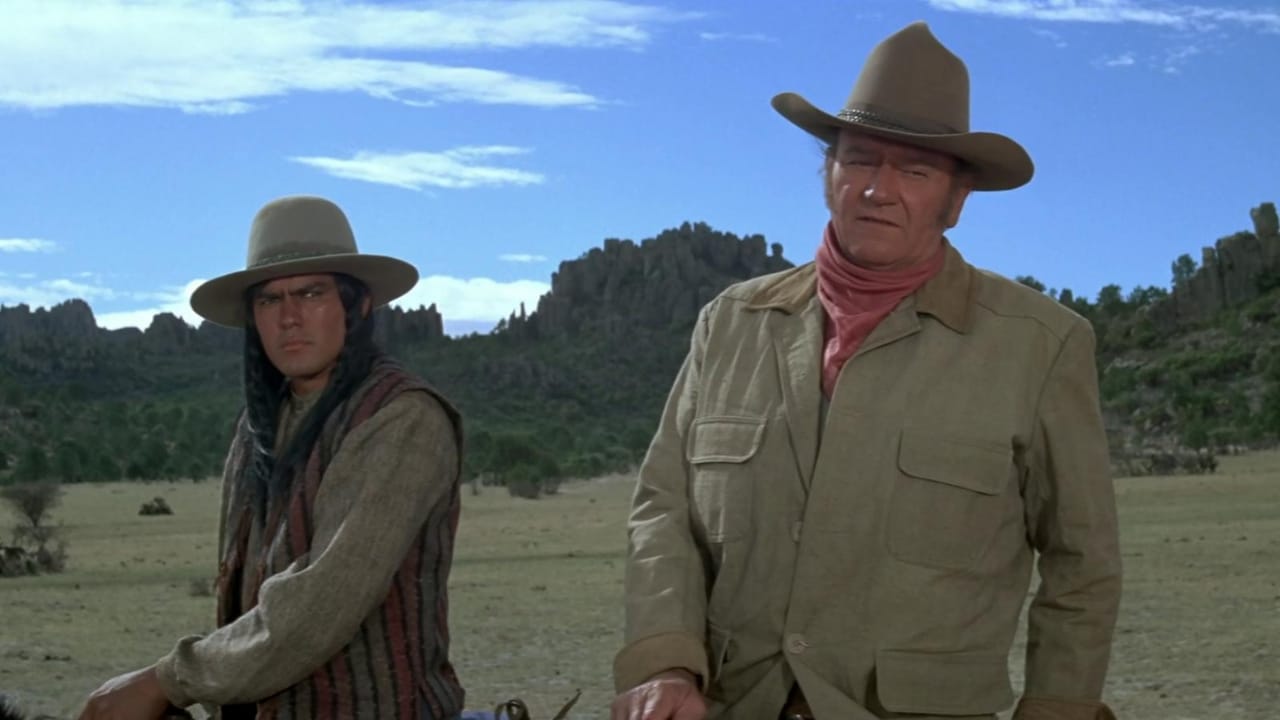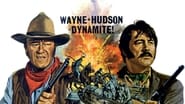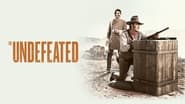kenstallings-65346
Some of the reviews here are in sore need of a history lesson! First, this movie is fine entertainment. And, that was all that was really intended. However, a few corrections to some other reviews are in order.1. Roman Gabriel's parents are of Filipino-American descent from Wilmington, North Carolina. Consequently, him playing the role of a Cherokee son of a war chief out of Oklahoma territory isn't a far-fetched piece of casting by any degree. In terms of it "being unlikely" for a young woman to be smitten by him, let's just say Gabriel had that effect on a great number of women!2. The plot of the movie is based on actual events, but of course a fictionalized version of them. In fact, politically speaking, the plot is quite realistic in showing the complex web of Mexican political struggle between the Austrian emperor Maximilian and Benito Juarez. Among the many serious moments of the film are presentations of the dire civil war between the Juareztas and Maximilians.3. Perhaps the most questionable (from a period moral standpoint) was the willingness of the protagonist to sell 3,000 prime horses to Maximilian. Doing so was in violation of the spirit of the Monroe Doctrine as well as a set of decrees by President Andrew Johnson in support of Juarez as well as a secret supply effort carried out by General Phil Sheridan, who, according to his private memoirs, provided weapons and ammunition to Juaresta forces, "which we left at convenient places on our side of the river to fall into their hands."4. Left unstated is the morally repugnant reality of former Confederates emigrating to Mexico to ally with Maximilian. Their intention was to set up fiefdoms inside Mexico. Maximilian's defeat ultimately prevented Mexico from becoming a European colony on America's border.By going just deep enough into the political issues, the movie strikes a balance of good entertainment with drama.
weezeralfalfa
This is the story of 2 groups of Americans shortly after the end of the Civil War(War Between the States). One group consists of ex-Union soldiers, under the leadership of ex-Col. John Henry Thomas(John Wayne), who are driving 3000 mustangs south to supply Emperor Maximilian's need for horses, in his fight against the Juarista rebels. Simultaneously, a group of ex-Confederate soldiers, under the leadership of ex-Col. James Langdon(Rock Hudson), of Louisiana, have abandoned what is left of their homes, and, masquerading as a bunch of refugees, travel past Union occupation forces, on the way to protection by Maximilian officials at Durango. Neither group will succeed in its mission. They were fool's errands. Their fates gradually become intertwined, as they traveled toward Durango, taking separate, but parallel, trails. There is some initial animosity between the rank and file of each, exasperated by Langdon's policy of having his ex-soldiers dress up in their uniforms, and flying the Confederate flag while camping! Regardless, the overall theme of the film clearly is that former Unionists and separatists need to reestablish their identities as unified Americans. We see this in the occasional cooperative ventures of the 2 groups, as in fighting off the bandits, the joint July 4 celebration, and, most importantly, in Thomas's ransoming of Langdon's group after they were captured by some rebels, and sentenced to be executed, unless Thomas's 3000 horses were brought to Gen. Rojas by noon the next day. There is also the civil rights-related statement in the hurried romance of Langdon's daughter: Charlotte(Melissa Newman) with Thomas's adopted son: Blue Boy(Roman Gabriel): a full-blooded Cherokee - very unlikely back when this story is set. ...... The director was Andrew McLaglin, who had previously directed the John Wayne comedic western: "McClintock". While comedy is a less important feature of the present film, we can see the probable influence of the big comedic brawl in "McClintock" on the big comedic brawl between Langdon's and Thomas's groups. Other comedic bits are scattered. For example, Langdon's shoving of the carpetbagger, who wanted to buy his plantation for a pittance, back into his carriage, upside down........After their initial meeting, the relationship between Langdon and Thomas is remarkably cordial for such recent enemies: part of the theme of reconciliation. Some reviewers wish they had more animosity toward each other, for excitement, but that would conflict with the theme. Of course, the much criticized bland finale, where the 2 groups are mingled in their retreat to the Rio Grande, is the final statement of sectional reconciliation. It ignores the financial disaster for both groups of their undertakings, and the question of how they are going to get back on their feet financially. By the way, Langdon seemed broke before his group started. How was his expedition financed?.......Shooting took place in a number of areas in Sonora and Durango provinces. The occasional shot of hundreds of horses, packed close together, flowing over the uneven landscape, is a sight to behold.
SnoopyStyle
After the Civil War, ex-Union Colonel John Henry Thomas (John Wayne) is leading his horses to be sold to the Mexican government. In the meanwhile, ex-Confederate Colonel James Langdon (Rock Hudson) is leading a rag-tag group of southerners who are going south to escape the Yankee mob. Both groups decide to join up as they fight off bandits and revolutionaries.This is a southerners wet dream. The southern forces are noble, honorable, and full of hospitality. They are fighting off arrogant Yankee carpetbaggers with their uppity blacks. Meanwhile their slaves are obedient, quietly waiting for the future as the master gives a family heirloom to an old slave.This is through and through an old fashion western where men are men. They have a good old fight after a good stiff drink. There is an impressive herd of horses. If you're willing to live with the hokey story, then this is definitely watchable.
James Hitchcock
The title of "The Undefeated" refers to those Confederates who refused to accept defeat in the American Civil War and migrated to Mexico rather than live under the Union. The film is loosely based on a true story, although the details are very much fictionalised. A group of Confederate soldiers, led by Colonel James Langdon, make their way with their families across Texas, hoping to cross the Rio Grande and to join Emperor Maximilian of Mexico, who has offered them land where they can make a new life. Langdon was once a wealthy plantation owner, but has been ruined financially by the war, and before leaving sets fire to his mansion rather than see it fall into the hands of Northerners.On the journey, Langdon meets an old Civil War antagonist, Colonel John Henry Thomas, who is leading a group of his former soldiers on an expedition to capture a herd of wild horses, which he is hoping to sell to the US government. Upon learning, however, that the Mexican government are willing to pay a better price, Thomas and his men also turn south with their captive herd. The film tells the story of what happens when the two groups of Americans, former enemies, are forced to work together to fight off attacks from bandits and from the Juaristas, republican opponents of Maximilian's government.A number of Westerns from this period had a Mexican-related theme and generally involve Americans becoming embroiled in either the Mexican civil war of the 1860s or the Mexican Revolution of the 1910s; others include "The Wild Bunch", "Two Mules for Sister Sara" and "The Professionals", with "Veracruz" being an earlier example from the fifties. The makers of "The Undefeated", however, were less concerned with the intricacies of Mexican politics than they were with putting across a message of American patriotism. Although the Confederates and Unionists have recently been fighting one another, they learn to respect one another and to unite against a common foe. Thomas and his men not only help the Confederates fight the bandits, they also give up their horses to ransom them when they are being held hostage by a Juarista general.The old divisions- North versus South, blue versus grey, abolitionists versus advocates of slavery- no longer matter; the reconciliation between the two groups takes place, very symbolically, at a Fourth of July party. What matters is that former Confederates and former Unionists are all now Americans, united against the world. Even non-whites are included; a romance develops between Thomas's adopted Indian son Blue Boy and Langdon's daughter. The implied message for the Americans of 1969 is that they must learn to overcome their own divisions- conservative versus liberal, young versus old, black versus white, pro-Vietnam war versus pacifists- in a similar way.This message of inclusive patriotism would have been dear to the heart of one of the film's two big stars, John Wayne, who plays Thomas. The following year Wayne was to make another Western, "Rio Lobo", about Northerners and Southerners learning to live together after the Civil War. It is a potentially interesting theme, but not one which this film makes the most of. Rock Hudson's performance as a Southern gentleman has been criticised, but for me he was not the problem with the film. I will leave comment on his accent to those who are more familiar with the dialects of the Deep South than I am, but I found his portrayal of a proud and honourable aristocrat a convincing one. John Wayne, however, had already shown in "The Green Berets" the year before that he was really too old to go on playing a front-line soldier, and he is no more credible here. The film also contains a few other implausible elements. There may have been men in the 1860s who would have had no objection to their daughter entering into a racially mixed marriage, but I doubt if a die-hard Confederate aristocrat like Langdon would have been one of them. The film ends with both Langdon and Thomas on surprisingly good terms with the Juarista General Rojas, even though he has shown himself to be both ruthless and treacherous and has threatened to shoot the Confederates in cold blood if his ransom demands are not met. The film is also overlong and its pace, particularly during the second half, tends to flag.The late sixties and early seventies saw the last great hurrah of the Western before its decline in the late seventies and eighties, but "The Undefeated" cannot compare in quality with some of the other offerings from the period, such as "The Wild Bunch", or Wayne's other film from 1969, "True Grit", or even with "Chisum", another collaboration between Wayne and director Andrew V. McLaglen from the following year. It is marginally better than the non-Western "The Green Berets", but to say that about a film is no very great praise. 5/10



 AD
AD






